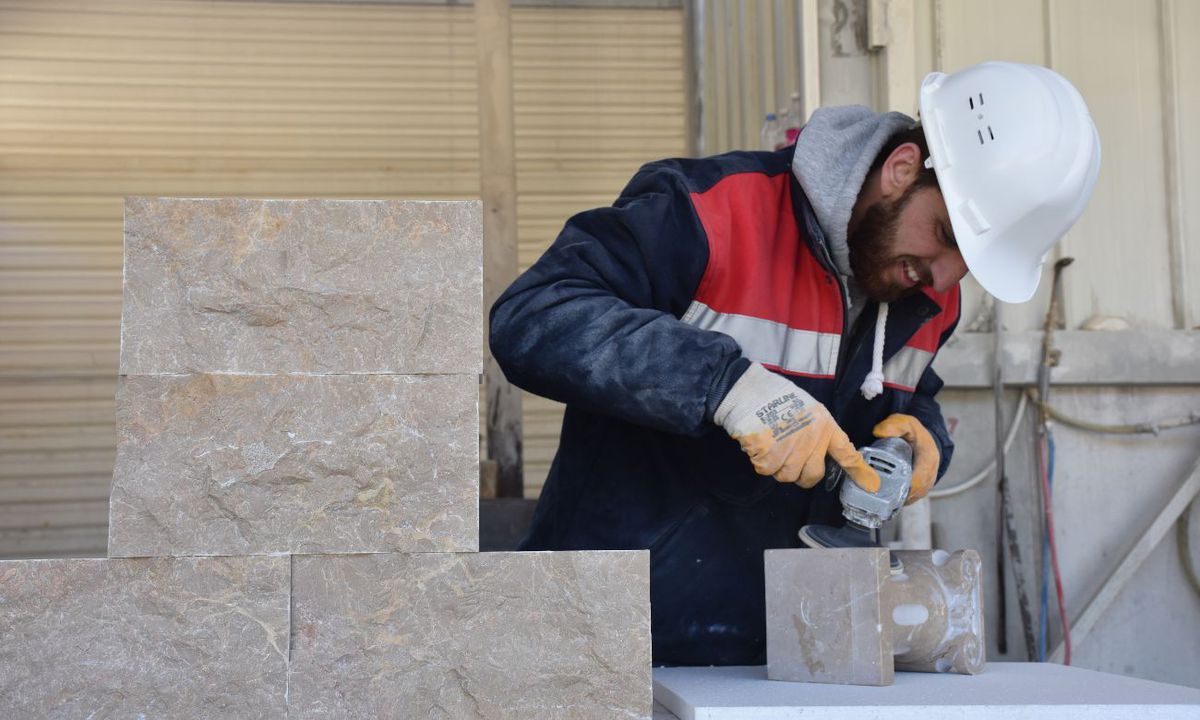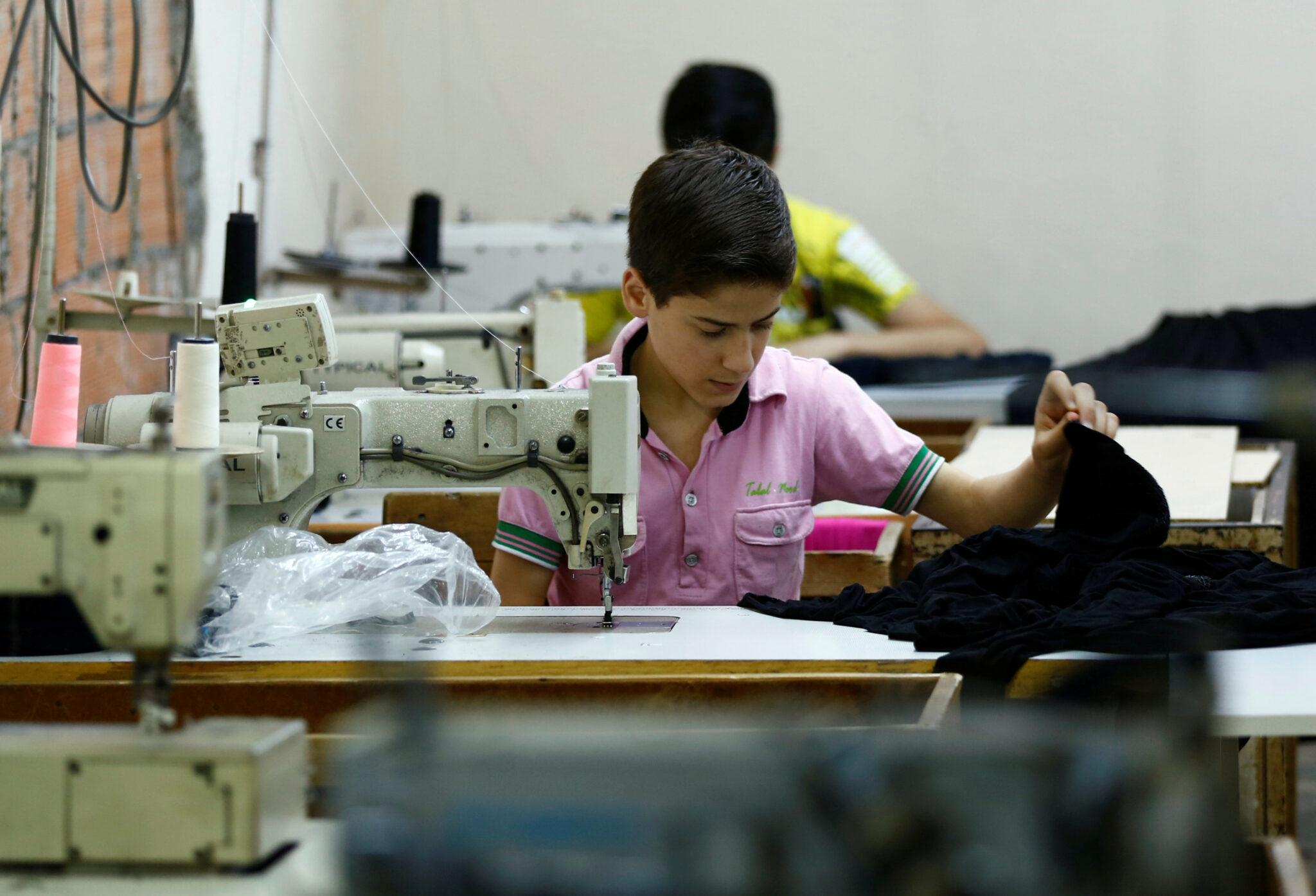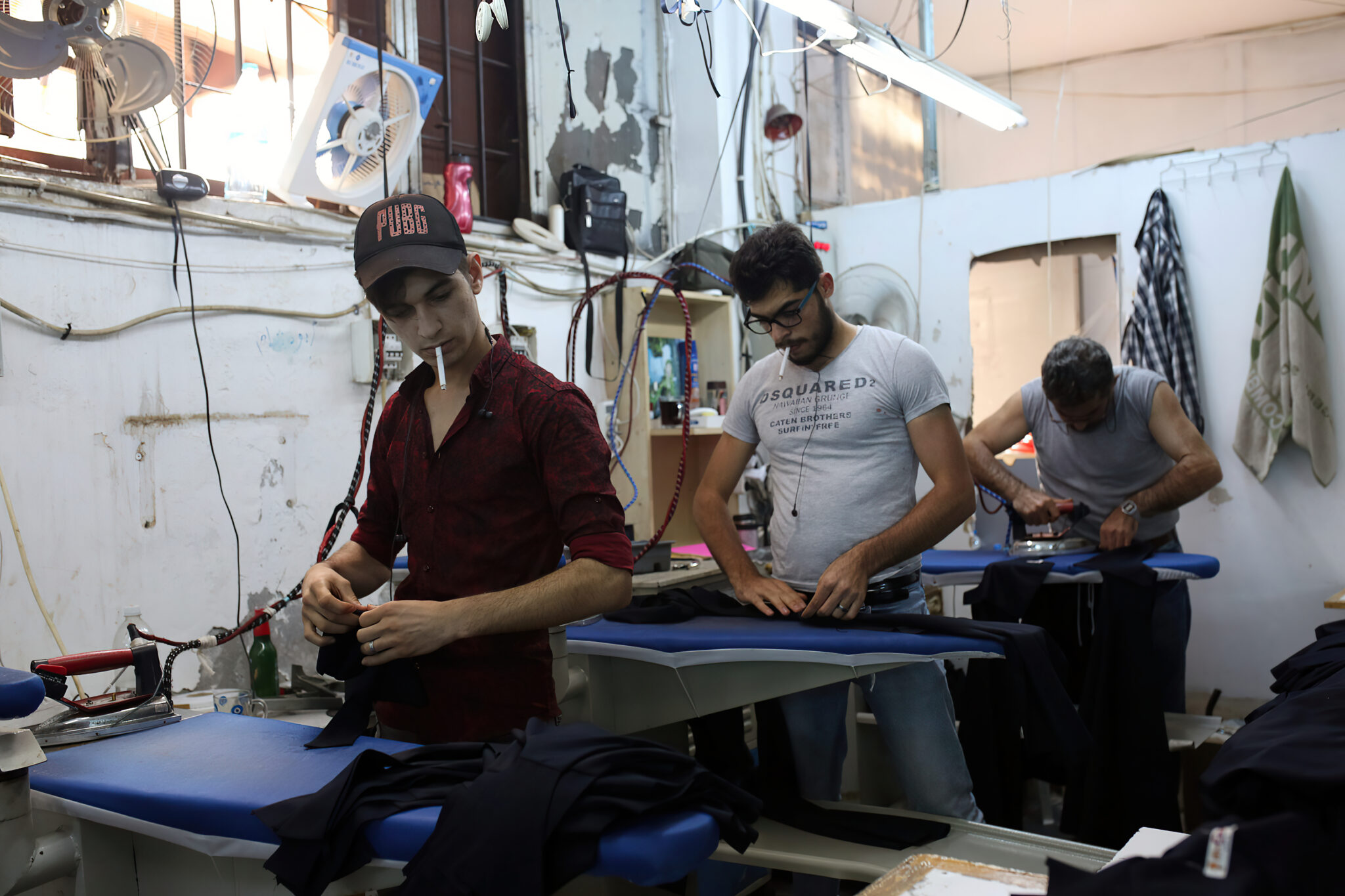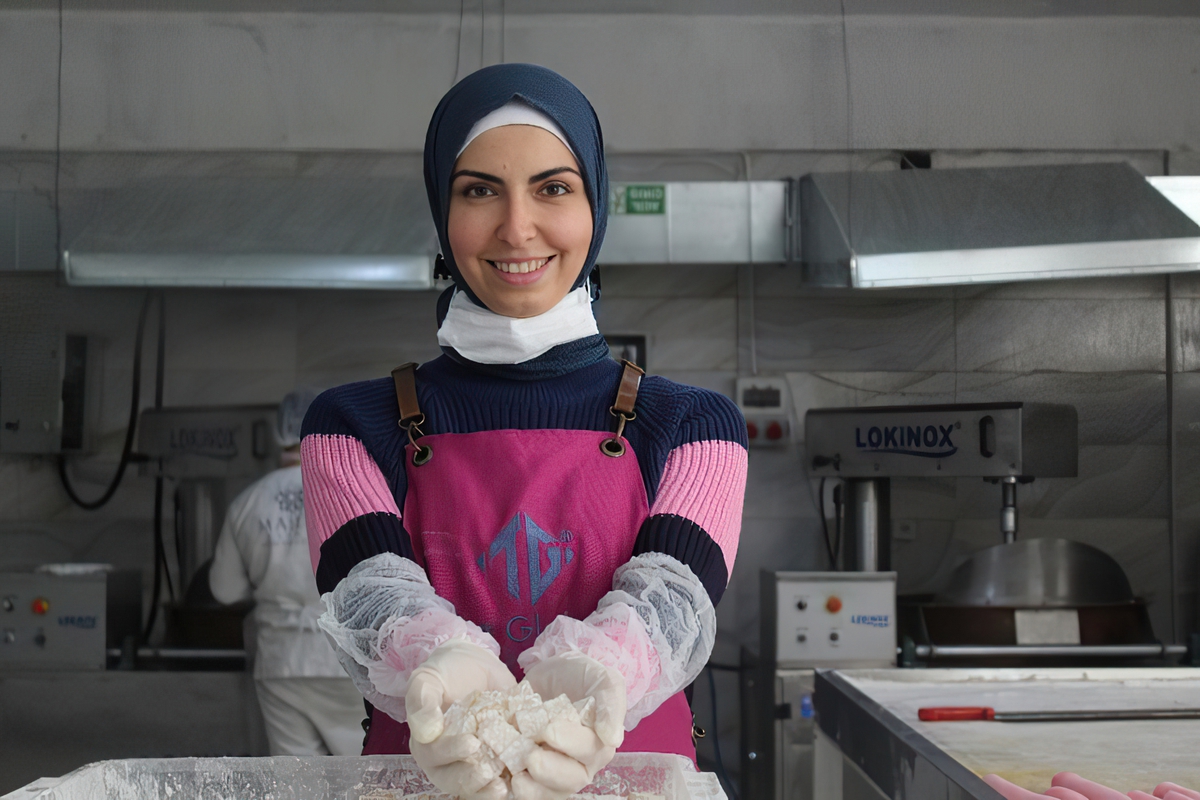


Mohammed Lozi Habab, who fled the war in Syria and sought refuge in Turkey, draws attention to the decorative products he makes of marble by hand in a marble factory in Bilecik, Turkey - 12 February 2022 (Anadolu Agency)


Diya Assi | Muhammed Fansa | Lujain Mourad
The absence of Syrians from workplaces and factories will never be easy for the reality of the Turkish economy. The government will be shocked by what it has overlooked, while the Turkish opposition will reap what it has sown from the growing hate speech.
Alaeddin Şengüler, a Turkish economic analyst and a member of the Independent Turkish Industrialists and Businessmen Association (MÜSİAD), blamed all Turkish political parties and the mainstream for not doing anything about the dwindling Syrian labor force.
While official figures show steady growth in the Turkish economy since the arrival of Syrian refugees, without asserting a role for them in this growth, it is not yet clear what impact the racist campaigns will have on the work sectors in which Syrians are active inside Turkey due to the absence of statistics.
Experts expect that the loss of the Syrians will have a negative impact on some professions and sectors that the Turks refrain from because of their difficulty.
In this file, Enab Baladi discussed with economic experts and researchers the transformation that the Turkish economy witnessed before and after the Syrian asylum, as well as the reality of the concerns circulating about the effects of the absence of Syrian labor on the Turkish economy.
The neglect of the Turkish state for 25 years to educate and prepare a group of young craftsmen in the workshops, away from theoretical studies, especially in university, has led to a shortage of skilled Turkish manpower.
The government of Turkish President Recep Tayyip Erdogan did not rectify this matter after taking power. Rather, it focused on building universities and institutes, which created a gap in the market, in which the Syrians were the cornerstone, Şengüler told Enab Baladi.
Şengüler believes that the dialectic of the “Muhajirin wal-Ansar” discourse in which Erdogan considered the Syrians as (referring to the depth of brotherhood based on his description of the beginnings of Islam and the support that occurred), in return the Syrians’ contributions and their ability to advance themselves were marginalized.
Also, it did not correspond to the behavior of a large segment of the Turkish people but rather reinforced the belief that the Syrians live on government subsidies derived from the people’s taxes.
Şengüler criticized the failure to highlight the amount of foreign aid obtained by the Turkish state in return for accommodating refugees, which inflicted moral damage on them, as well as statements regarding the amounts spent on Syrian refugees, which are an explicit fallacy that contradicts with the solidarity claims.
“The economy will be negatively affected, not because of the lack of Turkish competence in number and skill, but because of the abandonment of the sectors occupied by the Syrians, which caused a kind of passiveness that needs time to be harmonized by the Turkish labor force, which will harm the employers.”
|
The sharp political polarization of the Syrian presence file goes beyond the benefit derived from Syrian workers and investors for reasons related to gaining a larger popular base in the upcoming elections and identifying as much as possible with the popular mood, even if it conflicts with the general economic interest. Mohammad al-Abdullah, researcher at the Omran Center for Strategic Studies |

A Syrian worker in a sewing workshop in the Zeytinburnu neighborhood in Istanbul – 15 May 2019 (Reuters)
Owners of factories and workshops shared pictures of their empty facilities due to the decrease in the number of Syrian labor, causing them to fear the economic consequences of that.
As a result of the growing hate speech, the continuous restrictions, and the escalation of random deportation campaigns within the “voluntary return” plan, in addition to the continued deterioration of living conditions, thousands of Syrian refugees in Turkey have been forced to seek another refuge.
Since the start of the Syrian revolution in 2011, about four million Syrian refugees have gone to Turkey in search of stability and the safety they had lost in their country.
After years of attempts to compensate for their losses, and working in various fields, attempts to reach a state of stability have become a dream for most Syrian refugees in Turkey.
Within four months, the number of Syrians holding a temporary protection card (Kimlik) decreased by 105,778. When President Erdogan announced a project to return one million refugees, last May, their number reached 3,761,267 Syrian refugees.
Also, the number of Syrians who obtained a temporary protection card in Turkey is 3,656,157 people, according to the recent statistics of the General Directorate of Turkish Migration Management.
Many factors have led to a decrease in the number of Syrians in Turkey and charted two irreplaceable paths for the middle class and below, either the “voluntary return” or the illegal immigration to Europe.
“The path we walked is the path of death, but the fear of slow death in this country makes people move forward.” With these words, Mahmoud Maarawi, 24, justified choosing the path of illegal immigration after he lost hope of obtaining a secure future in Turkey, according to his own words.
Moving between Istanbul and Bursa, seeking to get a good job opportunity, bearing in mind the dangers of deportation because he did not have a permit to travel, Mahmoud spent four years at that risk as he carried the “Kimlik of Bursa city” (Temporary Protection Identity in Turkey) which does not authorize him to work in Istanbul.
After finding a job in Bursa, he faced a new problem in obtaining a work permit in a transport company where he worked, despite his repeated attempts.
“I left Turkey because I needed to feel like a human being again, to meet people who would acknowledge me after suffering from racism and restrictions,” Mahmoud added, considering the refusal to issue work permits and the refusal to issue “kimliks” and the banning of movement between states a method of “immobilization,” as he put it.
These harsh motives are common to most young Syrians who have chosen the illegal immigration route to Europe.
Hundreds of people took their way back to Syria, and many of them were subjected to deportation in multiple ways and for different reasons since the escalation of statements about “voluntary return” and the increasing restrictions on Syrian refugees in various areas of life.
While others chose to return after seeing it as an inevitable fate and the only option to escape the restrictions imposed on them as their fears increased about the possibility of staying in Turkey.
This is what appeared in its impact through many studies, including a study conducted by the Harmoon Center for Contemporary Studies entitled “Voluntary Return and the Reality of the Syrian Refugee in Turkey.”
The study concluded that talking about “voluntary return” and the procedures ensuing from it resulted in the Syrians’ growing fears about their chance of staying in Turkey.

Syrian youths in a sewing workshop in the Zeytinburnu neighborhood in Istanbul – 15 July 2019 (Anadolu Agency)
The International Labor Organization (ILO) said in March 2020 that Syrian workers contributed to the economy’s growth through the years of asylum in Turkey, and the number of workers in the Turkish market has reached about one million Syrians since 2017.
The ILO report aimed precisely at filling this information gap by providing statistics on Syrians’ living and working conditions, possible internal migration patterns, and on the impact of providing refugees with work permits.
Turkey also recorded the highest level of economic growth during the third quarter of 2021 among the Group of Twenty (the G20) countries, with a rate of 7.4%, compared to the same period in 2020, after the recovery in the economy with the gradual lifting of restrictions imposed by the Covid-19 pandemic.
According to the International Labor Organization, 97% of Syrians work without a work permit, while the Turkish Ministry of Labor and Social Security issued, until 2019 (the ministry’s latest report), about 140,000 work permits for Syrians.
Syrians holding temporary protection cards (Kimlik) were not allowed to obtain work permits until 15 January 2016, more than five years after the beginning of Syrian asylum in Turkey, forcing Syrians to work without social security.
Turkish employers exploited the largest proportion of Syrians because they were not registered in social security, which deprived them of many advantages in terms of wages and labor rights.
This was one of the main reasons for the spread of tension by Turkish workers against them, accusing them of seizing their opportunities in the labor market, due to the low wages they accept, according to what the researcher at the Omran Center, Mohammad al-Abdullah, told Enab Baladi.
The researcher added that a percentage of Syrian workers refrain from registering themselves in social security for reasons related to their access to humanitarian aid and their fear of stopping it.
This led to a “large media mobilization” against Syrian workers over the past years, accusing them of raising unemployment rates and their impact on the deteriorating living conditions.
According to the Turkish Statistics Authority (TÜİK), the unemployment rate was not actually affected by the arrival of Syrians, as the unemployment rate reached 12% in 2021, compared to 11.9% in 2010.
Al-Abdullah believes that what has actually deepened the impact of Syrian labor is the nature of the Turkish labor market, which occupies a low rank on the international classification, as more than 60% of Turkish workers are classified as informal workers.
“This was directly reflected on the reality of Syrian labor within this market and led to these negative social regressions against it in Turkish society,” the researcher added.
Under the title “Workers’ Rights Collapsing,” Turkey ranked tenth among the countries that most violated workers’ rights out of 148 countries covered by a report issued by the International Trade Union Confederation for the year 2022, documenting violations against workers around the world.
According to the International Labor Organization, most Syrian workers were working for minimum wages, while the work of Syrians was concentrated in the sectors of ready-made garments, trade, legal papers extraction, construction, and agriculture, with which Turkish workers refrained from working, for Syrians to make up this “deficit,” al-Abdullah said.
The migration or departure of Syrians may not affect the Turkish economy in a way that leads to its collapse because Turkey is considered an emerging country with an existing economy, despite the Syrians’ contribution to the economy, according to economic experts.
The researcher in financial and banking sciences, Dr. Firas Shaabo, says that in the absence of Syrians, there will be a “glitch” in the Turkish economy for a certain period until an alternative of African and Asian workers is found.
He noted that what the Turkish economy will lose in this scenario is the fast-learning skilled workers, who play the largest role in development.
Turkish law requires Syrians to obtain work permits that enable them to enter the labor market, and the Turkish Ministry of Labor makes submitting work permit applications a duty for any independent business owner in Turkey, whether he/she is the owner of a food store, sewing workshop, or textile factory.
Syrians holding a temporary protection card may not work outside the state from which they obtained their cards.
In response to Enab Baladi’s question about the Syrians’ impact on the Turkish economy, the Justice and Development Party’s deputy head for human rights and the party’s spokesperson, Yasin Aktay, said on the sidelines of an event to support Syrian entrepreneurs, “The influence of the Syrians on the Turkish economy is positive.”
Aktay added that “Syrians’ contribution to the economy is not limited to the labor market only, but rather they have had a major role in exporting Turkish products to the Arab market, through Syrian employees in Turkish companies.”

Syrian Amal Shammaa, owner of a small candy factory in the Turkish city of Gaziantep – 12 December 2020 (Anadolu Agency)
Syrian owners of capital and industrial expertise played an important role in the growth of the Turkish economy, as they invested in Turkey more than 10 billion US dollars, in various economic sectors in many Turkish cities, according to researcher Mohammad al-Abdullah.
They have helped in terms of production, export, and job opportunities for Turks since 2012, and this category has also received a lot of facilities from the Turkish government to localize its investments, which are now integrated into the Turkish economy, adds al-Abdullah.
According to the Turkish Takvim newspaper, the number of Syrian companies in Turkey by March 2021 amounted to about 20,000 small and medium-sized companies. As of January, Syrian-owned enterprises have contributed to the employment of 500,000 workers, including Turks.
The investments of Syrian businessmen in Turkey exceeded 10 billion US dollars, and their contribution to exports reached 3 billion US dollars to more than 50 countries, the newspaper added.
The EU-funded Euro-Mediterranean Forum of Economic Sciences Institutes (FEMISE) said in a report in September 2019 that the expected impact of Syrian refugees in terms of added value to the Turkish economy would rise to 4% by 2028, with one million Syrian refugee workers employed in Turkey.
According to the FEMISE report, from 2014 to 2016, the number of companies founded by Syrians in Turkey jumped by 168%.
At the end of 2017, Turkey had 4,793 Syrian companies with a capital of 39.1 million euros.
The report indicated that the impact of Syrian refugees in terms of the added value of refugees in the Turkish economy amounted to 4.3 billion euros by the end of 2017, or 1.96% of the total GDP in Turkey.
FEMISE expects the value to rise to 4% in 2028, with one million Syrian refugee workers employed on a regular basis in Turkey.
The financial researcher, Dr. Shaabo, highlighted that the Syrian merchants brought the owners of the companies to Turkey through the “social capital” represented by their commercial relations in the Arab countries.
The Syrians contributed to creating job opportunities for Turks through their companies and factories by virtue of Turkish law imposing the employment of a percentage of Turks in foreign companies.
In 2010, Turkey’s gross domestic product amounted to 776 billion US dollars, with an annual growth rate of 8.4%, and the volume of exports reached about 113 billion US dollars, and imports were about 185 billion US dollars.
While the gross domestic product amounted to 815 billion US dollars in 2021, with an annual growth rate of 11%, after the recovery in the economy after lifting the restrictions imposed by the COVID-19 pandemic, which was confirmed by the volume of exports, which amounted to about 225 billion US dollars, and imports to 271 billion US dollars.
On the other hand, the annual inflation rate during 2010 reached 8.6%, while it exceeded 80% last August compared to the same month of 2021, according to the latest Turkish statistics, according to consumer prices, driven by the consequences of the Russian war on Ukraine, and the rise in energy and food prices, with the decline in the value of the Turkish currency, in addition to the dollar exceeding the barrier of 18 Turkish liras, according to the Döviz website, which specializes in exchange rates and foreign currencies.
The expert Shaabo attributed the reason for the deteriorating Turkish economic conditions, such as inflation in recent times, to several factors, including the Turkish economic policy and foreign conditions such as the Russian war on Ukraine, in addition to the global inflation that occurred, ruling out that the presence of Syrian refugees is the main reason, as the Turkish opposition parties claim.
Shaabo indicated that the refugees may have affected the volume of demand, but he stressed the need to take into account the size of the large Arab community, which also contributed in this aspect.
Poll
Enab Baladi conducted an opinion poll on its website on the possibility of the Turkish economy being affected by the loss of Syrian labor with waves of migration and deportation.
The results were mixed, as 76% of the respondents voted “yes,” while 24% voted “no.”
Al-Abdullah, a researcher at the Omran Center, ruled out the exit of the category of Syrian owners of capital and industrial expertise that settled their investments in Turkey and received facilities from the Turkish government.
He attributed this to the cost of moving to another country, in addition to the businessmen’s unwillingness to lose the network of relationships they established since 2012, in addition to the acquisition of Turkish citizenship by the largest proportion of Syrian investors, he added.
Al-Abdullah believes that the category of Syrian labor that has filled a clear deficit in some sectors, such as agriculture and construction, and in which a large part of Turkish labor is reluctant to work, will inevitably be affected by the shortage of labor in the future.
It is difficult to measure the impact of the Syrians on the Turkish economy, with its negative and positive sides, for several reasons, according to the researcher, some of which are related to the technical aspect and others are related to the political aspect.
It is also difficult to predict the expected effects of the departure of large numbers of Syrians on the future of the Turkish economy, given the absence of accurate and published statistics on the size of employment and its sectoral distribution, according to al-Abdullah.
It is expected that there will be a significant shortage of labor in some sectors with a heavy labor force, such as the ready-to-wear textile and shoe industries, which would affect the percentage of Turkish exports, which occupied advanced ranks in the international arena, according to the researcher who indicated the possibility of some Syrian investments to emigrate.
if you think the article contain wrong information or you have additional details Send Correction